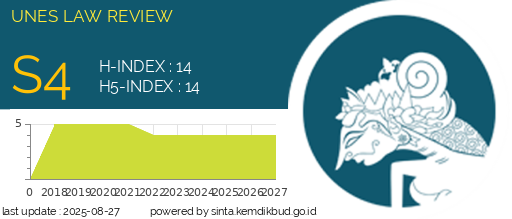Analisis Yuridis Pemberian Hibah Kepada Pejabat Ditinjau Dari Tindak Pidana Gratifikasi
DOI:
https://doi.org/10.31933/unesrev.v6i2.1296Keywords:
Gratuities, Grants,, CorruptionAbstract
Humans are social creatures who need each other to interact and carry out activities. In their daily life, humans are accustomed to doing something so that from this habit, laws are born that are agreed upon by the local community where the law was born. Because with the development of the times and the massive growth of humankind that is increasingly expanding, a law is needed that will become the single rule for all of society. Laws are made to provide protection and a sense of security for the community, but in some cases even though there are laws there are still those who commit criminal acts such as corruption. So it is necessary to have laws that regulate corruption at this time, because as technology develops, the modus operandi of corruption becomes more sophisticated. One of the efforts of criminal acts of corruption is giving gifts or grants to officials which is called gratuity. This study uses a type of qualitative research that examines and analyzes legal materials from relevant literature. The difference between gratuities and grants is needed is to avoid a legal vacuum or legal uncertainty, it will be difficult to ensnare corruptors into criminal acts, because basically grants are part of civil law making it difficult to fulfill elements of corruption. However, corruption through grants can be said to be gratification if it is given to state administrators and does not report the results of receiving the grant.
Downloads
References
Achmad Ali, 2012, Menguak Teori Hukum (Legal Theory) dan Teori Peradilan (Judicialprudence) Termasuk Interpretasi Undang-Undang (Legisprudence), Prenada Media Group, Jakarta, 2009
Evi Hartanti, 2014, Tindak Pidana Korupsi, Sinar Grafika, Jakarta
Edi Setiadi dan Rena Julia, 2010, Hukum Pidana Ekonomi, Graha Ilmu, Yogyakarta
Juniver Girsang, 2012, Abuse Of PowerPenyalahgunaan Kekuasaan Aparat Penegak Hukum Dalam Penanganan Tindak Pidana Korupsi, JG Publishing, Jakarta
Artidjo Alkostar, 2008, Korupsi Politik Di Negara Modern,FH UII Press, Yogyakarta
Anonim, 2013, Himpunan Lengkap Undang-Undang Tentang Uang, Laksana, Jogjakarta
R.Subekti dan R. Tjitrosudibio, 2013, Kitab Undang-Undang Hukum Perdata, Pradnya Pramita, Jakarta
Maria Farida Indrati S, 2007, Ilmu Perundang-Undangan 1, PT. Kanisius, Depok
Wirjono Prodjodikoro, 2011, Azas-Azas Hukum Perjanjian, CV. Mandar Maju, Bandung
Ni’matul Huda dan R. Nazriyah, 2011, Teori dan Pengujian Peraturan Perundang-Undangan, Nusa Media, Bandung
Downloads
Published
How to Cite
Issue
Section
License
Hak cipta :
Penulis yang mempublikasikan manuskripnya di jurnal ini menyetujui ketentuan berikut:
- Hak cipta pada setiap artikel adalah milik penulis.
- Penulis mengakui bahwa UNES Law Review berhak menjadi yang pertama menerbitkan dengan lisensi Creative Commons Attribution 4.0 International (Attribution 4.0 International CC BY 4.0) .
- Penulis dapat mengirimkan artikel secara terpisah, mengatur distribusi non-eksklusif manuskrip yang telah diterbitkan dalam jurnal ini ke versi lain (misalnya, dikirim ke repositori institusi penulis, publikasi ke dalam buku, dll.), dengan mengakui bahwa manuskrip telah diterbitkan pertama kali di Jurnal UNES Law Review.



















